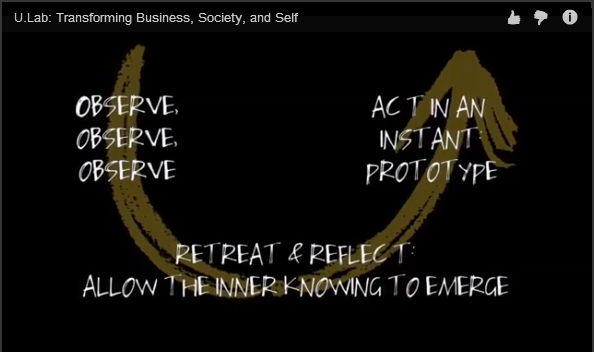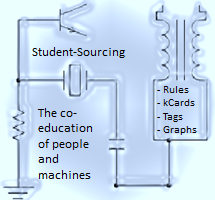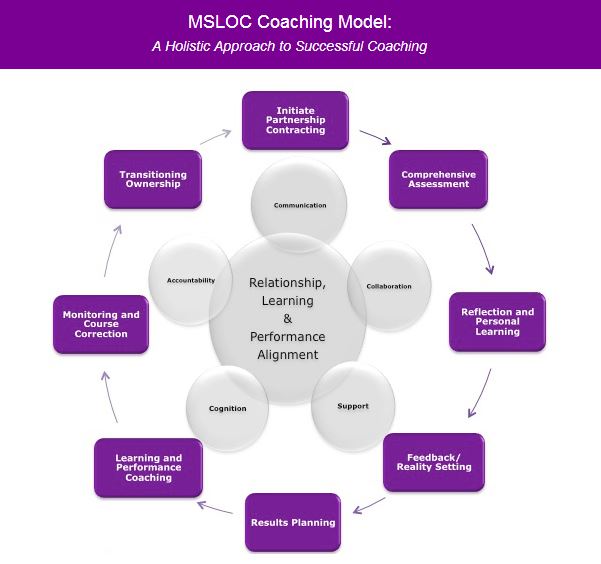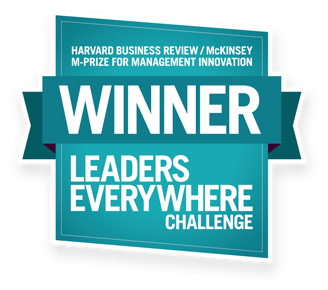Archive for the ‘Events’ Category
Unlock the Learning Labor in Your Organization
Tuesday, April 1st, 2014Let’s turn our corporate training/development efforts and university classrooms into learning communities that create structured content and computable knowledge with immediate economic and social value.
NeuroGaming 2014 – at the Cognitive Edge!
Thursday, March 27th, 2014 Imagine combining brain-computer interface technology, transcranial direct current stimulation, emotion sensors, eye tracking. other physiological sensors and augmented reality gear with interactive game play. What a brew for cognitive designers! Well that’s what you will get at the NeuroGaming conference and expo, May 7 -8 in San Francisco at the Metreon.
Imagine combining brain-computer interface technology, transcranial direct current stimulation, emotion sensors, eye tracking. other physiological sensors and augmented reality gear with interactive game play. What a brew for cognitive designers! Well that’s what you will get at the NeuroGaming conference and expo, May 7 -8 in San Francisco at the Metreon.
Using brain signals to control game play opens up many possibilities beyond entertainment. There are specific panels at the conference that will explore how neurogaming can accelerate wellness, learning and other cognitive functions.
Best of all you can go hands-on in the expo and experience:
* A brain controlled light and sound show
* Throwing trucks with your mind
* The latest brain wave reading headsets and devices
* Virtual reality and full immersion environments
* Haptic, motion and gesture control
* Neurocmodulators that electrically change brain states.
 You will see both medical and consumer grade applications.
You will see both medical and consumer grade applications.
There is even a two day hackathon the weekend before the conference where you can design, build and show off your own neurogaming concepts.
I hope readers that attend will share their insights here on the Cognitive Design Blog.
Micro-Learning for Performance Improvement
Sunday, January 12th, 2014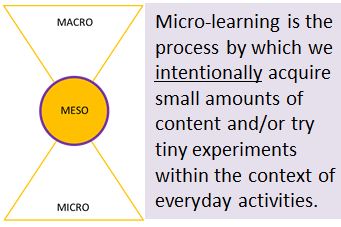 My free provocative ideas online webinar, use micro-learning techniques to change behaviors and improve performance is scheduled to run January 15 at 1pm ET. I will talk about how knowledge cards can be used to structure a rapid and low-cost approach to creating social mobile content that changes behavior.
My free provocative ideas online webinar, use micro-learning techniques to change behaviors and improve performance is scheduled to run January 15 at 1pm ET. I will talk about how knowledge cards can be used to structure a rapid and low-cost approach to creating social mobile content that changes behavior.
According to the host, Training Magazine, there are currently 684+ registered attendees. If you cannot make it, I will be moderating a discussion forum that will run after the webinar. It will include a recorded version of the event, additional background materials and an opportunity to share application ideas and even draft knowledge cards. You need to register to participate but it is free.
Hope you can join me in the event and participate in the discussion forum.
Northwestern Offers 1-Year Coaching Certificate
Friday, December 20th, 2013Being an effective workplace coach means you understand how people’s minds work especially when they learn and change. That’s the focus of a powerful new coaching program being offered in the learning and organizational change program at Northwestern. You will:
“Look deeply at the theory and practices behind learning and human performance in organizational settings while building a consulting “toolkit” that will help you be a more effective change leader.”
To earn a certificate you need to complete four courses. You can do that in a year from anywhere in the US. The program begins in March 2014 and there are two virtual information sessions in January.
If there is one coaching program I can recommend for cognitive designers this is it!
150 Ways to Make Your Organization More Agile
Monday, November 11th, 2013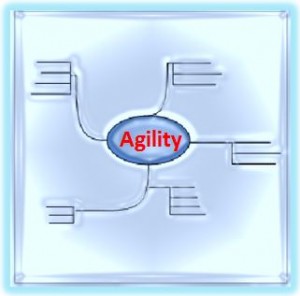 The Management Innovation Exchange (MIX) in cooperation with the Chartered Institute of Personnel and Development (CIPD) recently conducted a hackathon involving some 1700 HR professionals and business leaders aimed at cracking the code on agility. They released a report that summarizes nearly a 150 ideas organized into 9 design principles ranging from experimentation and learning to purpose and meaning. Nearly all of the design principles involve individual or group cognition and should be of interest to readers of the cognitive design blog.
The Management Innovation Exchange (MIX) in cooperation with the Chartered Institute of Personnel and Development (CIPD) recently conducted a hackathon involving some 1700 HR professionals and business leaders aimed at cracking the code on agility. They released a report that summarizes nearly a 150 ideas organized into 9 design principles ranging from experimentation and learning to purpose and meaning. Nearly all of the design principles involve individual or group cognition and should be of interest to readers of the cognitive design blog.
For example, one idea to is facilitate corporate earthquakes:
“The Corporate Earthquakes hack is all about crafting and anticipating an organization’s future by envisioning the unthinkable nightmares and dreams of tomorrow. This is done by designing and running corporate-wide hackathons focused on extreme, unusual, apocalyptic and why-not challenges and situations. The process is designed to be fun and inspire creativity, with possible corporate earthquakes including everything from likely industry shifts to unlikely events like mass alien abductions. “
What Can Designers do about Bullies?
Wednesday, October 16th, 2013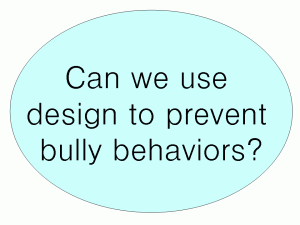 Bullying is a big problem in the US. It happens in schools, at work, on the internet, at home and in the community. Studies indicated that approximately 30% of US students are bullies or victims.
Bullying is a big problem in the US. It happens in schools, at work, on the internet, at home and in the community. Studies indicated that approximately 30% of US students are bullies or victims.
As the focus of cognitive design is to address deeply felt but unmet psychological needs, bullying is definitely a relevant challenge. Not only to help victims cope and ultimately forgive but to help design interventions that have the best chance of preventing bullying in the first place.
October is National Bullying Prevention Month and to help celebrate it Routledge has publish some free articles into the nature of the problem that are full of insights for cognitive designers.
I hope readers of the Cognitive Design blog will take up the challenge.
Provocative Ideas Webinar on Micro-Learning
Monday, October 7th, 2013 The training magazine network is hosting a provocative ideas webinar that I am giving on using micro-learning techniques to change behavior and improve performance. It will run for free on January 15 at 1 pm ET for an hour. Hope to see you there.
The training magazine network is hosting a provocative ideas webinar that I am giving on using micro-learning techniques to change behavior and improve performance. It will run for free on January 15 at 1 pm ET for an hour. Hope to see you there.
Session Description:
Micro-learning is the tiny bursts of learning we do every day to solve problems, make decisions and improve performance. All training involves a micro-learning phase if the goal is behavior change and ROI. Trainers tend not to emphasize this last mile of learning because it is too personalized, short lived and entangled in work. Learn how new technologies and methodologies are changing that.
Discover a new method for including micro-learning in training which breaks learning content into its smallest relevant chunks called knowledge cards. Successful examples and demonstrations in leadership, innovation, teamwork and emotional intelligence will be presented.
Cognitive Design Entry Wins M-Prize
Tuesday, October 1st, 2013“The entries came pouring in from every corner of the world—real-world case studies and bold hacks tackling the intersecting challenges of redistributing power and equipping and energizing people to lead even when they lack formal authority.”
Using Micro-Learning to Boost Influence Skills in Emergent Leaders
Putting Positive Psychology to Use
Sunday, September 8th, 2013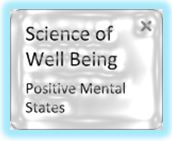 Positive psychology seeks to understand and improve talent, happiness, thriving, adaptability, well-being and other means by which we flourish and succeed. It has been recognized as a formal branch of psychology for over 15 years. It provides a unique and practical window into “how our minds actual work” and is therefore a vital source of insights for cognitive designers.
Positive psychology seeks to understand and improve talent, happiness, thriving, adaptability, well-being and other means by which we flourish and succeed. It has been recognized as a formal branch of psychology for over 15 years. It provides a unique and practical window into “how our minds actual work” and is therefore a vital source of insights for cognitive designers.
But what has it taught us? While that question is far too broad to deal with in a single post, I did find an interesting article, Three Insights from the Frontiers of Positive Psychology, that offers an interesting perspective. Here is the bottom line:
1. Being mindful (fully in the present moment) is essential for happiness but thinking about the future, in a constructive and empowering way is essential for meaningfulness.
2. Regular detachment from work has greater restorative power than your typical vacation.
3. Physical design of our environment has a distinct and lasting impact on our mood and other mental states. Open, green well-kept spaces have a positive impact.
None of these insights is a surprise. Indeed some are a part of our folk psychology or wisdom. For example, insight two sounds a lot like “don’t bring your work home”. While this is true having a scientific understanding or explanation does have its advantages. Most notably it helps to rationally justify investments in certain types of interventions and will take some of the guess work out of our design efforts.
It falls to the cognitive designer to turn these insights into useful interventions, programs, products, services and daily habits that help us flourish.
